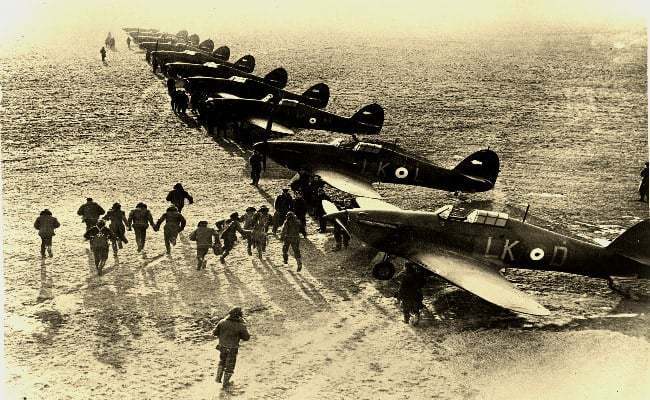The battle of Britain was between Nazi Germany and Britain, and it lasted for three and a half months from July 10th, 1940 to October 31st, 1940. The Germans called it the “Die Luftschalact um England”, meaning “Air battle for England.”
The Royal Air Force (RAF) defended the UK against the German Air Force (Luftwaffe). The primary objective of the Germans was to compel the British to agree to a peace negotiation and settlement. This was something the Germans thought was forthcoming since their defeat of France in June 1940. But even though some in Britain were willing to talk settlement with Germany, Churchill would hear nothing of a British surrender. The Battle began with the Luftwaffe targeting coastal shipping areas and RAF airstrips and infrastructure. As the battle dragged on, the Luftwaffe targeted factories and strategic infrastructure. By the end the of the battle, the Luftwaffe was bombing political targets and civilians in order to get the British to back down and to assert their dominance over the RAF.
But the Luftwaffe failed and it was the RAF who proved to be the better air force. The defeat at the Battle of Britain caused Hitler to cancel Operation Sea Lion which was to be his air and amphibious invasion of Britain.
That is just the beginning of the story of the Battle of Britain. Here are some things many people don’t know about this early World War II battle.
10. It was more than just a Victory for the British

According to statistics, the RAF fighters were made of 2,937 pilot fighters, but only around 2,350 were British. Twenty percent of them were volunteers from Commonwealth countries such as Canada, Australia, South Africa, and New Zealand as well as expatriates from Poland, Czechoslovakia, Belgium and other countries that had already fallen to the Nazis. The refugees who had lost their countries and were more than willing to give their lives to help the British fight for the chance to save Europe. There were even American pilots who had joined up to help the British to fight for what they believed was right.
There were so many foreign pilots that joined the RAF that many squadrons were divided by country. The Polish forces had the 302 and the 303 Squadron. The 303 Squadron was considered the most successful squadron of all the Allied squadrons the Battle of Britain with 176 kills. There were several Polish pilots of note with more than 15 kills each but perhaps the most recognized pilot with the 303 squadron wasn’t Polish at all, and he wasn’t even a member of the squadron.
Sgt Josef Frantisek was from Czechoslovakia, he was assigned to the Czech squadron but he preferred to fly alongside his Polish comrades. Desperate for pilots, the British allowed Frantisek to be an unofficial member of the 303 squadron, as an independent pilot. So he followed his own rules, and at times flew off alone, patrolling through areas he anticipated the German aircraft traveled on their way back to base. The German planes returning to base would likely be damaged and low on fuel, so he would ambush the fighter planes brutally bringing them down. He was able to score 17 victories in this manner.

